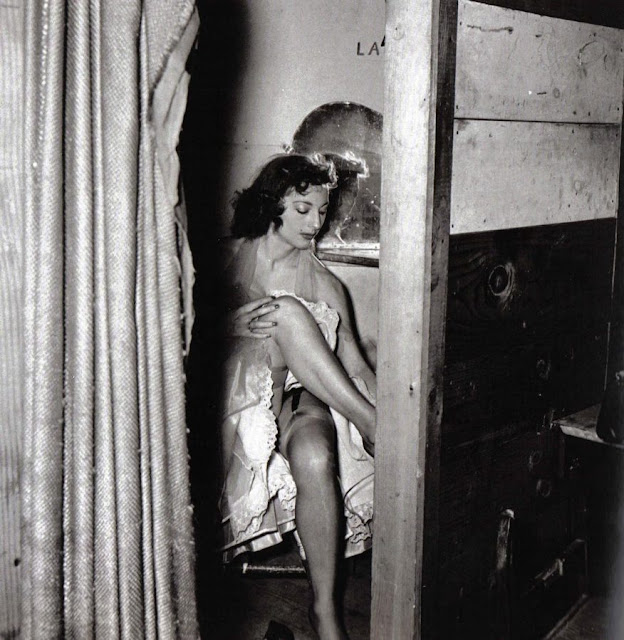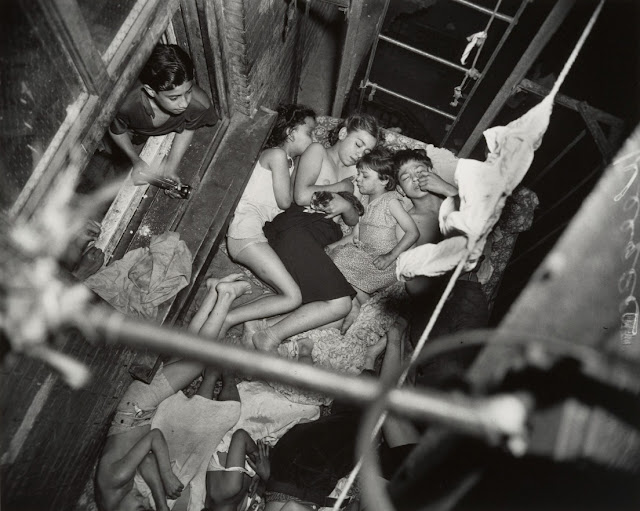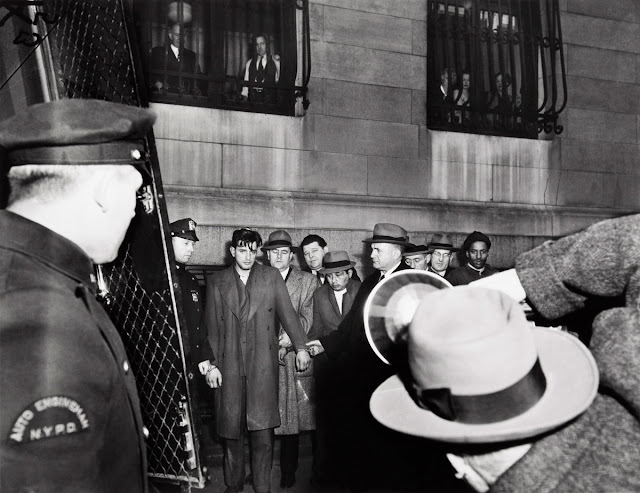Weegee, born Usher Fellig on June 12, 1899 in the town of Lemburg (now in Ukraine), first worked as a photographer at age fourteen, three years after his family immigrated to the United States, where his first name was changed to the more American-sounding Arthur.
Self-taught, he held many other photography-related jobs before gaining regular employment at a photography studio in lower Manhattan in 1918. This job led him to others at a variety of newspapers until, in 1935, he became a freelance news photographer. He centered his practice around police headquarters and in 1938 obtained permission to install a police radio in his car. This allowed him to take the first and most sensational photographs of news events and offer them for sale to publications such as the
Herald-Tribune,
Daily News,
Post, the
Sun, and
PM Weekly, among others.
During the 1940s, Weegee's photographs appeared outside the mainstream press and met success there as well. New York's Photo League held an exhibition of his work in 1941, and the Museum of Modern Art began collecting his work and exhibited it in 1943. Weegee published his photographs in several books, including
Naked City (1945),
Weegee's People (1946), and
Naked Hollywood (1953). After moving to Hollywood in 1947, he devoted most of his energy to making 16-millimeter films and photographs for his "Distortions" series, a project that resulted in experimental portraits of celebrities and political figures.
Weegee's photographic oeuvre is unusual in that it was successful in the popular media and respected by the fine-art community during his lifetime. His photographs' ability to navigate between these two realms comes from the strong emotional connection forged between the viewer and the characters in his photographs, as well as from Weegee's skill at choosing the most telling and significant moments of the events he photographed.
 |
| Summer on the Lower East Side, 1937 |
 |
| Gold-painted stripper |
 |
| Operators of a wire service arrested at their headquarters after a gambling raid, 1941 |
 |
| Subway Serves as Blackout Shelter, August 13, 1943 |
 |
| The dead man's wife arrived, and she collapsed, ca. 1940 |
 |
| The show's going to start any minute, ca. 1950 |
 |
| Then She Cries, Frank Sinatra Concert, Paramount Theater, New York, November 5, 1944 |
 |
| Title unknown |
 |
| Untitled [Police officer and lodge member looking at blanket-covered body of woman trampled to death in excursion-ship stampede, New York], 1941 |
 |
| Vegetable Dealer, 1946 |
 |
| Woman signing autographs [anyone recognize her?] |
 |
| Woman sleeping in movie theater, ca. 1943 |
 |
| At an East Side murder, 1943 |
 |
| At the Jazz Concert, 1944 |
 |
| Children on Fire Escape, 1938 |
 |
| Circus audience, ca. 1943 |
 |
| Coney Island 1940 |
 |
| Lineup for Night Court, ca. 1941 |
 |
| Lost Child, Coney Island, 1941 |
 |
| Lovers in a Bowery Bar |
 |
| Lovers with 3-D glasses at the Palace Theater, 1943 |
 |
| Retail butchers lined up at Ft. Greene Market, Brooklyn, in the early dawn, hoping for a little meat to sell from their shops, March 19, 1943 |
























.jpg)





